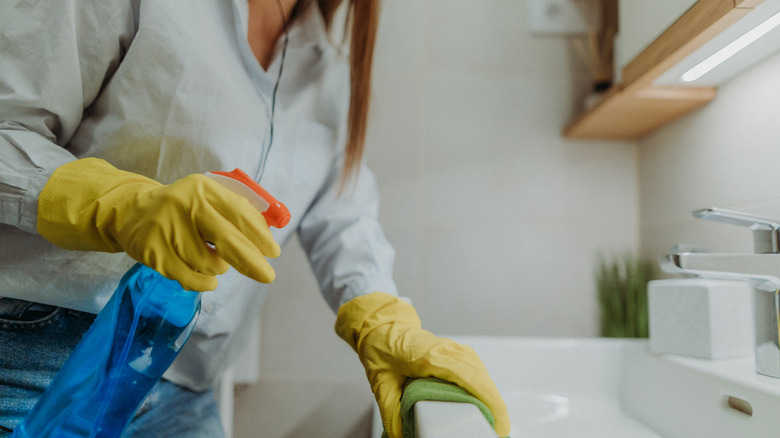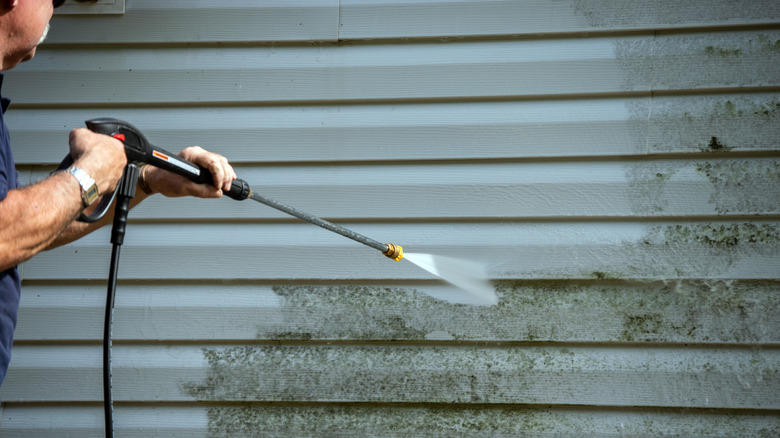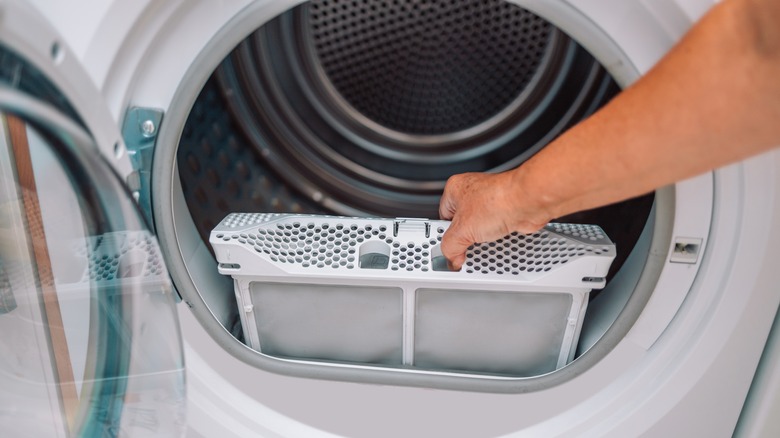Unexpected Things That Can Kill You Almost Instantly
We are all keenly aware of the dangers lurking outside of our homes. Everything from guns to car accidents are credible threats that could put your life in jeopardy. For example, the Gun Violence Archive reported 18,854 deaths due to guns in 2023. The National Safety Council also reported that, in 2021, almost 47,000 deaths could be attributed to motor vehicle mishaps.
However, if you think that staying indoors in the safety of your own home will keep you from harm, you're unfortunately mistaken. According to the National Safety Council, approximately 175,000 preventable, injury-related deaths occurred in homes and communities in 2021. These accounted for almost 80% of preventable, injury-related deaths that year. They also reported that deaths at home increased by 13%, and have been on a steady increase of more than 300% in the last quarter century. So, it's clear that staying inside isn't going to help you. Instead, it's better to be smart and vigilant about the seemingly harmless threats that are right under your roof.
Cleaning your bathroom
Bathrooms are notorious breeding grounds for bacteria, so it's essential that you clean yours regularly. According to WebMD, your bathroom can host such unpleasant things as norovirus, E. coli bacteria, salmonella, staphylococcus aureus, and various molds and mildews. Henry Ford Health also notes that your toilet seat alone can play host to more than 200,000 colony-forming bacteria.
So, it's clear that not cleaning your bathroom can be dangerous. But if you aren't careful, giving your lavatory a scrub-down could also be just as dangerous and even deadly. According to the Washington State Department of Health, mixing bleach and ammonia while cleaning household spaces such as your bathroom can create toxic gases known as chloramines. These gases can lead to a number of symptoms, including shortness of breath and fluid in the lungs. Additionally, per the American Lung Association, many household products release dangerous chemicals known as volatile organic compounds (VOCS). They can cause a number of issues, including respiratory illness, headaches, and allergic reactions.
Household plants
There can be a great number of benefits to keeping plants around the house. According to Piedmont Healthcare, indoor plants are good for the air quality of your home. They also reduce stress and can lower blood pressure. However, it's important to be aware of what plants you're bringing into your home, as some plants can be deadly.
The sap of such plants as Dieffenbachia, commonly known as dumb cane, can cause the tongue to swell large enough to block a person's airway (via Better Homes & Gardens). Spring bulbs like daffodils may look festive and inviting, but mistakenly eating their bulbs, which look somewhat like shallots, can cause stomach pain, high blood pressure, irregular heartbeat, and, in serious cases, death. Low-trailing plants like English ivy and philodendron are also toxic, causing skin irritation, burning in the throat, fever, vomiting, and diarrhea. The plants are only toxic when consumed, so it's most important that you keep them out of reach of children and your pets.
A pressure washer
They can be very useful for cleaning caked-on dirt and grime from your house siding or deck, but the risks of using high pressure washers are greater than you might think. Experts at the Old Republic Insurance Group warn that the sheer force of the spray from a pressure washer is powerful enough to wound a person. And because of the force of the spray and the dirt and other particles being kicked up, the wound can become infected very quickly and easily. Without treatment, a person could lose a limb or even die.
In addition, the Centers for Disease Control and Prevention notes that, on top of the risk of physical injury from the stream of water, pressure washers also carry with them a risk of electric shock and carbon monoxide poisoning if not used properly. People working nearby can also be injured if they aren't careful, as the force of the water can cause objects to move suddenly or be thrown.
Air conditioners
You're certainly grateful to have AC on a hot day in July, but that doesn't mean that there isn't some risk involved. If your AC unit is old, it can create a number of problems. For instance, the ductwork and filters can harbor dangerous mold, bacteria, and allergens. Left untreated, people in the house may experience coughing, wheezing, or congestion.
Additionally, if you have an older AC unit, it could be a fire hazard, with older parts that generate more heat as they struggle to work. If they aren't replaced, the system could catch fire. Faulty wiring is also a potential hazard in older units, with many of the wires being located in places that are either hard to see, hard to access, or both. If you have an older unit, you should make sure that it's been properly cleaned and that the parts and wiring are not so out of date as to cause a fire.
Electric blankets
Cuddling up under a warm electric blanket when it's cold outside is an attractive prospect. But, in certain cases, they can be dangerous. According to Columbia University, there is a concern with electric blankets that if they get too hot, they could cause burns. This is especially the case with older blankets that don't shut off automatically when they get too hot. Ideally, you should consider using the blanket to warm the bed up and then turn it off before actually getting in.
Additionally, there is a risk of heat stroke associated with the use of electric blankets. A 2006 study published in the American Journal of Forensic Medicine and Pathology listed two cases, one involving a 41-year-old man and the other involving a 13-year-old girl, both of whom were found unresponsive in their beds underneath electric blankets. The man's body temperature was 106.2 degrees Fahrenheit, while the girl's was 105.8 degrees Fahrenheit.
Cheating on your spouse
As it turns out, extramarital sex can be a killer, and not just if your spouse finds out. According to a 2009 study published in the International Journal of Andrology, researchers at the University of Florence found that infidelity was linked to a high risk of cardiovascular events. The study showed that heart attacks, particularly fatal ones, were uncommon when men were home and having sex with their wives. The majority of men who suffered a fatal incident during sex were with someone other than their wives and away from home.
This idea is further corroborated by a 2012 study published in Circulation. That study looked at an autopsy report of more than 5,500 patients who had experienced sudden death. Of the ones who had died during sexual intercourse, 82% to 93% were men. And the majority of those men, 75% to be exact, were having sex outside of marriage, usually with a younger partner.
Magnets
Small household magnets, like the ones on your refrigerator door or used as toys, can be very dangerous if swallowed. According to UC Davis Health, if these magnets are swallowed, they can become attached together inside the body. When that happens, they can create fistulas, which are abnormal connections within the body, or even holes in the intestine.
The National Capital Poison Center reports that, in 2019, almost 1,600 cases of magnet ingestion were reported to the U.S. Poison Control Centers. Additionally, there were 1,700 hospital visits between 2009 and 2011 due to people, mostly children, swallowing magnets. In some cases, surgery was required to remove the magnets; in one instance, the child did not survive. In the cases of the children who did survive, many of them suffered permanent damage to the digestive tract. This is in part because, when the magnets join together or a single magnet joins with another metal object that a child may have swallowed, it can cut off the blood supply to that area, leading to tissue death.
Dryer lint
Letting lint build up in your dryer is asking for trouble. According to the National Fire Protection Association, fire departments have responded to almost 16,000 fires every year that are related to washing machines or dryers. These fires have been responsible for 13 deaths, 444 injuries, and more than $238 million in property damage. Perhaps surprisingly, out of all those fires, more than one-fourth could be directly attributed to the accumulation of lint, fibers, or dust within the dryer.
According to Consumer Reports, in order to prevent dryer fires, you need to clean out the lint trap after every single load. But it's not just the lint trap that can cause a fire to spark. You also need to make sure the dryer duct is cleaned annually. If you are noticing that your clothes are taking longer to dry, it could be a sign that lint is building up somewhere in the duct and needs to be cleared out.
Stairs
Most people need to go up and down stairs every day, either at work or at home, but they can present a real problem for you if you aren't careful. According to a 2018 study published in the American Journal of Emergency Medicine, more than a million patients are treated in emergency rooms for stair-related accidents each year. Of these accidents, almost 70% were from people whose ages ranged anywhere from 11 to 60 years old.
Part of the reason people are injured on stairs, according to a 2023 study published in PLoS One, is the fact that they aren't always careful on them. The study showed that, on a short staircase, no one used the handrail, 16.1% were on a device, and 16.4% were engaged in conversation. On a longer staircase, some did use the handrail, but 64.8% of participants still did not. With this in mind, it's wise to always use the handrail, avoid running on stairs, pay full attention while going up or down, and keep one hand available at all times to catch yourself if you fall.










